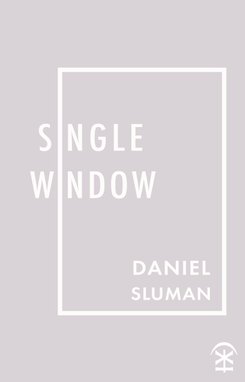Single Window (Shortlisted, TS Eliot Prize, 2021)
Single Window is Daniel Sluman’s third collection. In this book-length poem, Sluman meditates on a year of his life (2016-17) when chronic illness confined he and his wife, Emily, to a sofa in their living room. Written in free verse, with powerful use of white space, the words are interlaced with photographs by Emily Brenchi-Sluman. The coupling of word and image in this work not only becomes a documentary but is a powerful nod to the shared nature of their experience.
In the year where their sense of time is compromised, and their sense of space is constricted to a sofa ‘that holds us like a mother’, the couple navigate disability, suffering, distance and intimacy in a room where a single window serves as their only physical access to the world: ‘how we drag ourselves/ from week to week / & the world carries the beautiful/ like the room carries the light / from the window.’
With remarkable and tight imagery that transfigures the daily-ness of the couple’s lives, Sluman helps defamiliarize disability:
& i can feel
myself turninginto one of these
slow-pulsed creaturesbobbing through
centuriesof sluggish time
with youthe duvet sunk
over mesoft as the jaws
of a basking shark […]
With short lines, and soft vowel sounds (‘slow’, ‘bobbing’, ‘over’, ‘soft’, jaws’), Sluman creates a lull that is torn apart by the sharpness of the shark at the end. The trauma of disease and pain cleaves the body from the mind (‘this lapse/ between what the body feels / & the mind calls for in turn’). It is a condition that medicine alone cannot fix:
[H]ow all medicine
pulls you away from yourself
just enough to create distance […]
Distance is a formal presence in this book. Sluman carefully builds his utterances around it, articulates not only the wedge it drives between his body and mind but between the world (‘with a thankfulness pitched/ against the horror of lives like ours’) and the couple. Even the minimal outside contact they have in the form of their carer leaves them still ‘adrift / in our pacific-blue hoodies.’ In these ways, the poem stresses the stigmatization and marginalization of the disabled in Tory Britain.
But there is a redeeming force that prevails – love.
Whether it is in the act of Emily sewing a pair of trousers for her soon-to-be husband (‘making a space in this world for me to fill/ rounding the edge to hang off me like a crescent moon/ you ply your love seam by seam’), or in making love, the couple’s intimacy is not merely erotic but life-giving:
[T]hey will never love like this
our whole bodies into the earth
of each other […]
In these lines, and elsewhere through the evocation of isolation and distance, Sluman’s work brings to mind John Donne’s self-proclaimed sonnet ‘The Good Morrow.’ In the latter’s poem, the lovers possess each other and in doing so, the whole world. In having each other, they have no need of the world with its maps and hemispheres, but can content themselves in the little room that replaces the world, and becomes ’an everywhere’. It is interesting to see how Donne writing three compacted stanzas (or building rooms) in the robust iambic pentameter creates a coherent compact space. And although his speaker chooses the room, his mind is full of the world which will present itself at a moment’s notice -should he so choose. He has replaced the world.
Sluman’s artistic choices of metre, space, and image create the contrast that the disabled and marginalized must face. The world has pushed him to the margins, and is distant, almost impervious.
But love remains as potent through the centuries:
[T]his subtle insistence
of tending for the other’s bodymind
an ideology we uphold
a stitch we pull tight
time & time again […]
Skendha Singh


Leave a Reply